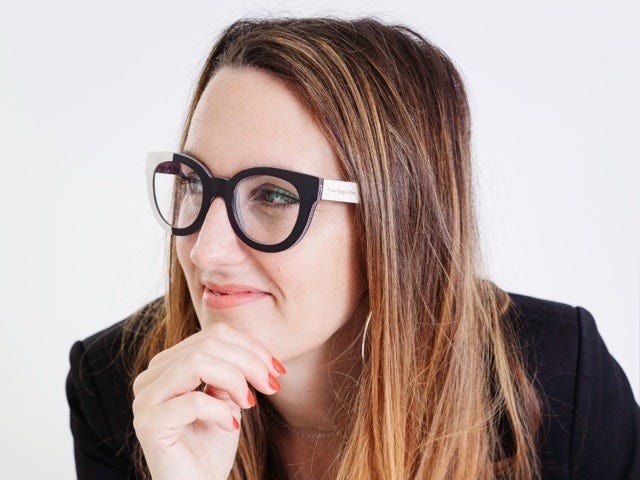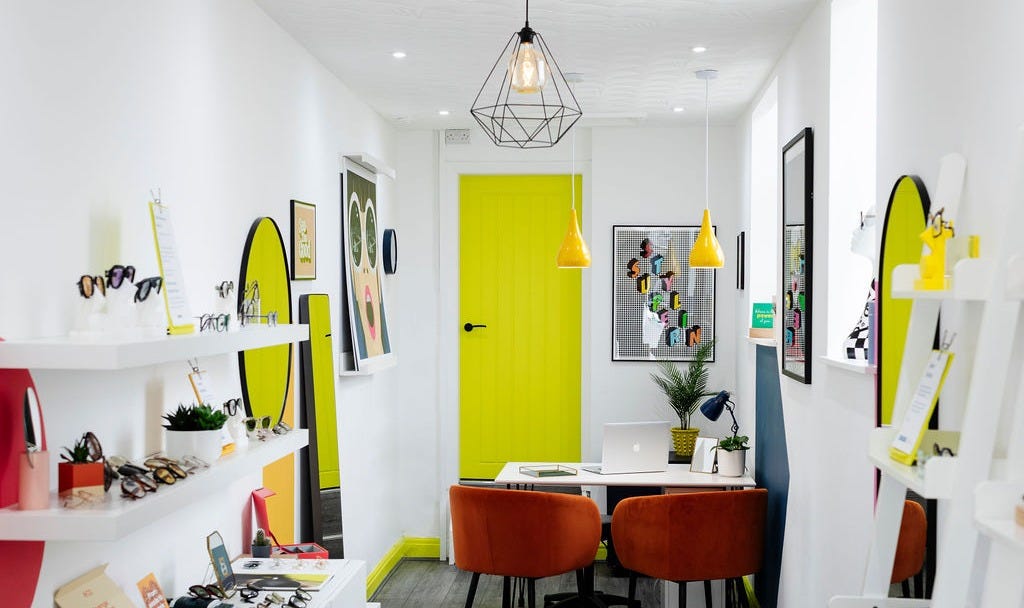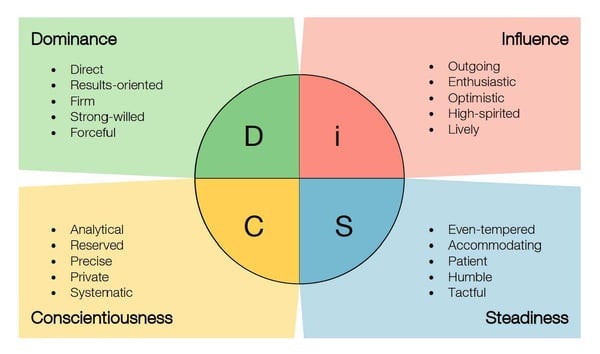A Note to Start: This piece of writing is a self-reflection exercise. One needed in order to progress. Take from it what you can or will that relates to your own journey, and know that future pieces will be more outwardly reflective. Much less of the ‘I’ word.
When people ask what I do now, I hesitate. For many years I’ve been able to answer this question simply, in a few words; I’m an Eyewear Stylist, I’m a Dispensing Optician, I founded Eyestyle Studio - a place where I help people find the glasses that bring them joy, that generate confidence and compliments. A studio, a role, a shorthand that said just enough. But those words no longer fit.
So what do you do when the words you’ve leaned on stop being true? Or at least now aren’t the only ones you can use to describe the thing that you do?
The Director Peter Brook once said that just a few weeks into rehearsal, a director isn’t the same person as they were at the beginning of the production. The work we do changes us, revealing and developing who we are and who we might be. That’s the adventure.1
That’s the shift and adventure for me too. I’m not the same woman that obsessed over an idea during the course of two maternity periods. I’m not the same woman that in 2017 launched Spexbox with an ambitious pop-up shop at a local art gallery with ZERO audience. Then there’s the launch of not one, but three different dispensing only locations each with their own personality, the re-brand (forced but turned out to be a winner), Brexit, Covid, the launch of an online styling model that actually works, colour analysis training and three unbelievable years on the high street I actually wanted to be on at the start (but couldn’t afford until later). It’s been an adventure for sure and a learning journey like no other.
It’s not easy though, the relentlessness of solo business. Especially one where you’re challenging norms, changing behaviours and testing the unique. So when I decided to close Eyestyle Studio there was disbelief and shock from all avenues; why would I do such a thing when I’d finally got what I wanted and it was starting to work?
In all honesty, I’d proved my point. That it could be done. That I could do it, and against all odds.
I’d pivoted, learned and flexed beyond all recognition, and done it again and again and again, and I was tired. A creative mind is a gift and a curse. An excess of ideas and a shortage of time is a killer. And knowing that I didn’t want a team of people, I didn’t want to find ‘another me’ as I’d been advised to do, I didn’t want multiple sites, I didn’t want to get an optometrist; I realised that to have the impact I’d always wanted to have, I’d need to let go.
You can read about that here:
Coincidentally, around the same time as these thoughts were fermenting, I was being approached by numerous companies to do various interesting projects in the optical industry that excited me. They were right up my skill street and would allow me the creativity I so loved, but in a far more flexible way. I’d have the working pattern I wanted (one that really worked for my family), the head-space to create, high impact on the topics I was passionate about and the freedom to develop a few things I’ve had in my mind for years.
No brainer really. Time to close.2
So who am I now?
I’ve closed Eyestyle Studio and realised the labels no longer fit. I remember having a conversation with another retail business owner last year; they were having the ‘should I close?’ dilemma and I brought up Seth Godin’s description of sunk costs.
“All of these costs are sunk. We can’t undo them. They’re a gift from our former selves. But like all gifts, we don’t have to accept them.”
Seth Godin
It can be all too tempting to stick with something when you’ve invested so much of yourself into it. It’s easy, it’s safe (or safer), it’s comfortable. There’s a belief that it defines you, that you can’t move on or change this identity. But you do need to separate what you’ve invested from what you’ve gained. My costs weren’t sunk; they were invested by me, for me, in me. Too many people don’t have the courage to take risks, to evolve and strive to be better. For me, that’s all I’ve ever known.
I knew I had to apply this very healthy logic to my own situation and really examine what I was holding to and the reasons I was holding on. I realised that all the things I loved about Eyestyle Studio; the people, the connections, the styling, the creativity, the impact; I could still have without the physical restrictions of the Studio. That and far more. I also knew that at this point I was too ‘comfortable’. Closing would actually give me even more creativity around the concept I’d built and allow me time back in the industry to help others have that same level of impact. It would allow me to evolve.
…entrepreneurs may not be artists but they frequently think like them. Both are ahead of their time, starting before anyone asks them to. That means they take risks, encounter opposition or rejection but they keep going. If successful, they frequently change; much to the frustration of managers and investors who’d prefer they keep mining the same seam, they’ve little interest in repeating themselves. Both revel in exploration, discovery and change, where they find and express their freedom. And both understand the importance of Faulkner’s advice: ‘Kill your darlings.”3
The Shift
Whilst searching for ‘the words’ I came across an article, How to Discover What You’re Actually Good At - The 12 Points of Pleasure at Work. I love a scoring mechanism to help my brain organise data and although it didn’t give me any clear answers (I’ll explain why shortly), it did help me identify factors that are important and also how those factors have changed over recent years, culminating in my current situation.
Nathalia advises putting your six highest scores in order as a basis for understanding your preferences better. I struggled a little with this because I had four factors that scored 9 and four that scored 8; not really what you’d call a sliding scale! I also remembered with a smile the numerous DISC profiles I’ve completed over the course of my career; one in particular when I moved from being a Group Practice Manager to Business Coach. In that one I came out right in the middle of the circle! At the time I questioned whether I had some sort of personality disorder, but it turns out I was just moving towards the skills I’d need in a new role. A year later I was right at the top of the circle (slightly more ‘i’ though).
Perhaps this process of finding the right words to describe what I do is necessary each time I evolve my role. Perhaps I’m just getting better and faster at figuring out what’s needed now and this is all just part of my journey.
The Name Game
Stylist. Founder. Director. Consultant. Coach. Dispensing Optician. Mentor. Writer. Guru (cringe!). Heard them all.
I hate the labels, for me personally, they seem both too small and too loaded. They restrict. I am not only any one of those things, I am all of them (apart from the last one). Yet I can’t really use them all surely? I’m either going to appear like I can’t commit to one thing or like I’m overly arrogant.
At this point I’ll only tell you that Nick Atkins4 was both the catalyst and the calming figure behind this introspection. When I was asked to join the expert panel at Independents Day this year I initially couldn’t quite wrap my head around it. Why me? I think I’d been hampered by the view that because I hadn’t spoken to the optical industry since opening Eyestyle Studio, I was under the misconception that I wasn’t visible anymore. Nick used the word ‘eclectic’ when it came to my profile and background, so perhaps my value is in the fact that I’ve gone sideways, and up-ways and diagonally across many sectors in the industry, so I have a unique perspective. Whatever the case, I’ll always be grateful he asked because it gave me food for thought right at a time where I was battling with my own idea of sunk costs.
Value
It’s a funny word, isn’t it? Often interpreted as cheap, bargain, two-for-one. That’s not value, that’s cost. Value is different. It’s the importance or worth of something for someone. It’s the years you’ve spent learning, the graft nobody sees, the way you can spot (and solve) a problem before it even has a name. It’s the experience you bring to the table even when, on the surface, the job looks simple.
I’ve been thinking a lot about this since I closed Eyestyle Studio. Without that neat little box, I’ve had to ask myself: how do I talk about what I actually do? Because on paper, yes it might look like styling, or consulting or a bit of this and that. But the truth is, when you work with me, you’re getting far more than the obvious job description. And that’s the bit we often forget isn’t it? Our own value. I’ve been guilty of downplaying mine before. But now? That’s not an option. The industry is shifting, technology is and will change how people purchase, wear and even think about eyewear; so it needs people who can flex, adapt and look sideways at a challenge. That’s where my real value sits; in the things you don’t see at first glance. This is where my eclectic learnings and depth of experience become a strength, not a liability.
That’s been on my mind lately; how you talk about value when you don’t have a neat job title to wave around anymore.
What are you REALLY getting?
I’ve had some very interesting conversations and proposals of late from a variety of areas in the optical industry, some asking for my help or expertise, others scouting to see what I might be open to. I’ve accepted some fantastic projects and I’m evolving some others. But there’s already a lot in my inbox. This is why I now need to get laser-focused clarity on exactly what I will and won’t do, and who for. It’s also why I’ve been searching for a label or a title that fits. Until I’m clear on this, others won’t be.
The reason I have EXACTLY the right clientele for Eyestyle Studio is because I spent an inordinate amount of time clarifying and attracting those people, and I actively repelled the ones who weren’t for me. I’m not good at being everything for everybody. In fact I’d argue that’s the case for many practices and frame suppliers too (although some haven’t realised it yet). So when you ask me to do ‘x’; style a frame, fix a look, attract new clients, give some advice, make a plan - it’s nice and neat. You’ll get what you ask for.
But beyond that, because of all the zigs and zags I have taken, I have a fairly unique set of skills:
Nearly 20 years of experience and practice - not just theory, but knowing what actually works in the real world. Want someone who can really do ‘dispensing only’, I’m it. Want someone who knows what works and what doesn’t when it comes to frame styling, designs, fits and colours? That’s me.
A nose for ideas - I can’t help it, I see sideways. I’ll connect the dots you didn’t even know were there and come up with a list of ways to make something work before you can blink.
An understanding of people - I make people feel good. Beyond the practical styling of eyewear it’s about understanding the person you’re trying reach; their emotions, motivations, struggles and joys. Whether styling a client, or working with a supplier, forging real connections in a world of AI is not only valuable, it’s essential.
Honesty - I’ll tell you if it’s rubbish. Kindly, but directly. No fluff. I’m northern, it’s the way we speak. Humour guaranteed.
Industry insight - I’ve lived the changes. I’ve tested the possibilities. I’ve seen the shifts in technology, trends and habits. I know what’s coming round the corner.
A way of telling stories that attract customers- Whether in person, on social, with written copy, on a website or with printed marketing material it’s never information, it’s a story people will remember. I turn the technical or ordinary into something people actually care about.
The skill of execution - this is everything. Business owners spend too much time and money on ill-conceived ideas, taking shortcuts and creating plans (or not creating them at all) without the ability to execute. I get the job done.
Risk
Closing Eyestyle Studio was intentional, a (calculated) risk. It felt like pulling away the safety net again, that neat little label I could hide behind. I had a ready-made answer to the question ‘what do you do?’, but I was too comfortable; once again it was time to move on.
I don’t like titles. I’m not a Dispensing Optician. I’m not an Eyewear Stylist. I’m not a content creator. I don’t fancy being called a guru and a thought-leader. The truth is, I don’t fit neatly in any of those boxes. And that’s uncomfortable, which is how I like it. Because the world loves a box. One title, one snapshot. We often hold a frozen version of people in our heads, and that’s what’s been happening with me. Some people still picture me in the ‘Studio Owner’ frame. Others expect me to have a shiny new label by now. But what if I don’t want one?
Here’s the risk: if you don’t fit into a tidy job title, people think you’re either a bit flaky or a bit arrogant. But the flip side is, if you cling tightly to the old title, you stop growing. So I’d rather take the risk. I’d rather be a bit in-between, because truthfully, that’s where all the exciting and interesting things happen.
So where does that leave me?
Somewhere between old titles and new ones I suppose, with a confusing LinkedIn profile to boot. Not boxed in, not fully defined, but still bringing all of that value with me.
I’ve got some projects on the go I can’t talk about yet, and I’ve had a few unexpected approaches that have made me sit up and think. There’s a little bit of space in my diary now too, which is both daunting and exciting. But it’s also a chance to be clear about what I offer and what it’s worth.
Because no, I don’t have a title. The people that work with me don’t need one, they get far more than the surface job role. They don’t buy a day of my time, they get years of graft, a head full of ideas, the ability to implement and execute, honesty, clarity and someone who can flex right outside the usual role. And maybe that’s the point. Identity isn’t just about the title, it’s about the value you bring, the stuff that doesn’t always fit neatly into a LinkedIn box.
What I bring is part industry insight, part customer insight, part strategy, part ideas-generator. I help businesses see themselves differently and highlight opportunities they didn’t know were there. Sometimes it’s about me spotting the blind spot or asking the question that no one else thought to ask, that shifts your whole approach and adds enormous value.
What’s next?
Whilst I work on other projects (shhh…can’t say yet) I have got some time and expertise to offer.
Who might want to work with me?
Ambitious practice owners looking for a new perspective
Eyewear geeks wanting to explore the Dispensing Only optical model
Frame manufacturers, distributors and agents looking for an edge
Lens manufacturers who want to make the intangible more compelling
Optical journals, magazines and websites looking for an occasional or regular contributor
I’m also considering the odd day in a practice, to keep my hands in and my mind open. Just considering at this point; I’m not sure if so many years doing it completely my own way has rendered me unemployable from a standard dispensing point of view! That said - if you’re looking to smash a styling event, from a lead-up and promotional perspective and provide some real styling expertise on the day, I reckon I can do that.
If you’ve got something on your mind, I’m always up for a straight, no obligation chat. No hard sell, just a proper conversation and virtual cuppa to see if we’re a fit. Get in touch if you fancy it.
Email: rebecca@eyestylestudio.com
WhatsApp: 07822034256
On the Level, Substack: Margaret Heffernan. July 2025.
Not forever, the wonderful clients I’ve served along the way are extremely excited about the upcoming pop-up store. Taking place March 21-26th 2026.
On the Level, Substack: Margaret Heffernan. July 2025.
Often linked to William Faulkner but more accurately used by Arthur Quiller-Couch. This advice encourages writers to remove elements; whether it’s a witty line, a memorable character or a detailed scene, if they don’t advance the plot, serve the story’s purpose or aren’t essential to the larger narrative. “Killing your darlings” requires a detached, stoic approach to self-editing.
Managing Director/Founder at Positive Impact. Managing Director Independents Day. https://www.linkedin.com/in/nick-atkins-a56a5a7/






